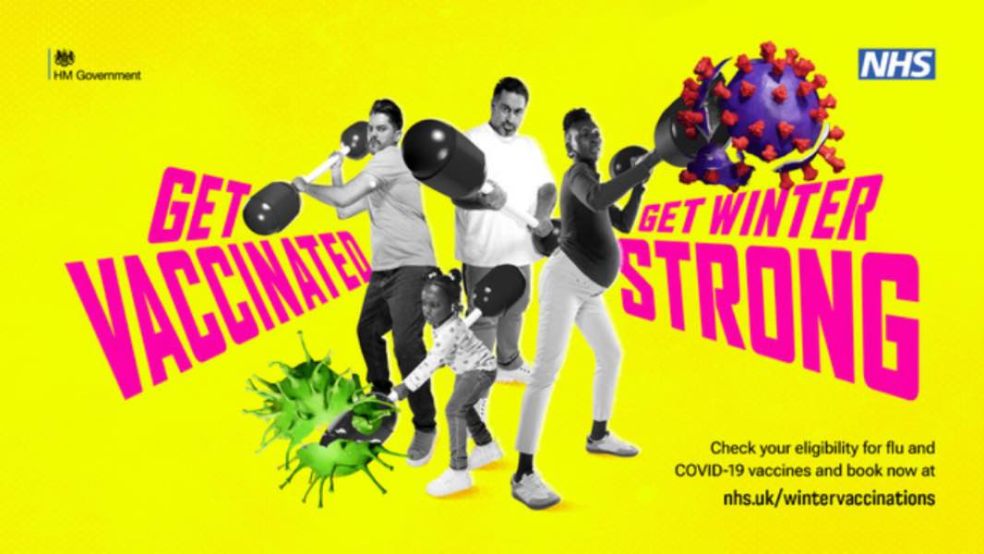
NHS reminds people to get ‘winter strong’ following increase in local covid cases
The rollout of COVID and flu vaccines for older adults, care home residents and those with long term health conditions kicked off this month as the NHS drive to protect against a ‘tripledemic’ of viruses this winter continues.
The NHS in Devon is preparing for the winter period and encouraging local people to make best use of health services and protect themselves with winter vaccinations to get ‘winter strong’.
Those eligible can book appointments, with hundreds of thousands of slots still available via the NHS website, the NHS App, or by calling 119 for free. The flu vaccine can also be booked by searching online for a local pharmacy and there are walk in sites available to get the COVID-19 vaccine.
The NHS has already invited over 11 million people to come forward and GP practices and other local NHS services will also be contacting people to offer both vaccines, but those that are eligible do not have to wait to receive an invitation to be able to book.
Flu vaccinations for children and pregnant women started on 1 September, to help stop the virus spreading as schools returned.
Flu season usually peaks in December and January so starting adult vaccinations from October ensures those most at risk are protected during the colder months when people gather indoors, and viruses spread.
Earlier this month, new figures from UKHSA showed that over the past two winters there have been at least 18,000 deaths associated with flu and over 19,500 deaths associated with COVID-19.
The Respiratory syncytial virus (RSV) jab is also available to those aged 75 to 79 and to pregnant women from 28 weeks to protect their child, with evidence showing it could prevent thousands of A&E attendances, hospital admissions, and serious cases this winter alone.
Dr Alex Degan, NHS Devon’s Medical Director for Primary Care, said: “The NHS in Devon has been preparing for the busy winter period and we’re asking everyone to ‘help us help you’ by choosing the right treatment options.
“With new figures showing thousands of deaths associated with COVID and flu in recent years, and increasing cases of the viruses locally, it is clear that the threat of winter viruses is all too real, and it is vital that anyone eligible takes up the offer to get vaccinated.
“GP practices, pharmacies and other NHS teams offer quick and easy appointments, so if you have not booked yet then please do using the NHS website, NHS App, or by calling 119 – it could keep you out of hospital this winter.
“With the risk of a ‘tripledemic’ of winter viruses – COVID, flu and RSV – if you are pregnant or aged 75 to 79, it is also so important that you join those who have protected themselves against RSV in the last month to boost you or your child’s protection against a very nasty illness.”
To reduce the risk of spreading viruses:
- wash your hands often with warm water and soap
- cover your mouth and nose with a tissue when you cough or sneeze (if you do not have a tissue, cough or sneeze into the bend of your elbow, not into your hand)
- bin used tissues as quickly as possible
- try to stay at home and avoid contact with other people if you have a high temperature or you do not feel well enough to do your normal activities.
As well as getting vaccinated, there are simple actions local people can take to help reduce pressure on busy hospitals this winter. The message is that urgent and emergency care will be there for you, but please choose the right service for your needs. The advice is to:
- Make sure you have ordered and collected any repeat medicines, especially if you are travelling
- Continue to call 999 in emergency and life-threatening cases - when someone is seriously ill or injured, or their life is at risk
- Go to NHS 111 online if you need medical help or advice, or you are unsure about whether you should go to hospital; you can also phone 111
- Play your part by taking simple steps to look after yourselves and loved ones, checking in on vulnerable family members and neighbours. A first step is making sure your medicine cabinet is well-stocked
- Make use of community pharmacies, which can advise on minor illnesses and provide medications.
- If you develop flu or covid, but have mild symptoms, you shouldn’t need to seek medical advice. Rest, stay hydrated and keep warm.
Background:
- For more information on when to call 999 and when to go to A&E, you can visit the NHS UK website.
- For local healthcare information, visit the One Devon website https://onedevon.org.uk/our-work/services-and-support/health-pressures/













